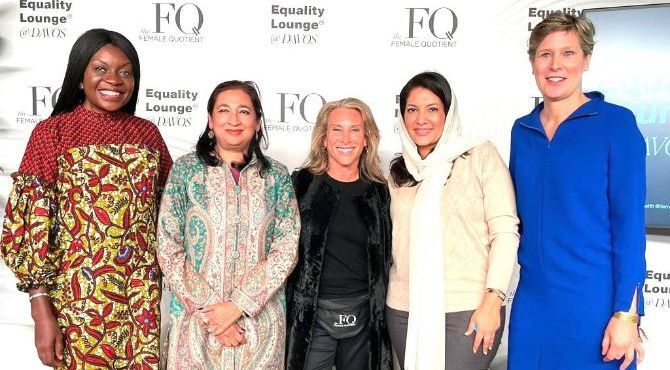Blueprint for a new, more inclusive workplace: Dr Anino Emuwa
Dr Anino Emuwa shares her thoughts on the opportunities to rewrite the workplace and make it more diverse and inclusive ahead of her Keynote at the Inspiring Global Women for Growth event on 10 March. The event will bring together outstanding global women passionate about the opportunities for women working in an international context and what they need to thrive.

Despite the increasing engagement of women in public life, bias against female leadership remains and in some countries is on the rise, according to the Reykjavik Index for Leadership, an annual international study.Even though women have made headway in leading private companies and public organisations, it seems that perception of female leadership is going backwards. In the Reykjavik study, younger people demonstrate less progressive views than their parents.Against this background, Dr Anino Emuwa, Founder and Managing Director of Avandis Consulting, a strategy and financial advisory firm in France, a diversity and inclusion advocate and the founder of 100Women@Davos, is still hopeful and positive that change is underway.A former corporate banker with Citibank, she is a member of the Institute of Directors’ Expert Advisory Group on Diversity and Inclusion. Anino also sits on several international advisory boards including Reykjavik Global Community, working to ensure that more women attain and retain power, and Empower Now which helps companies and organisations gain an overview of the status of DEI within the workplace. Anino is also a Regional Lead for Cartier Women’s Initiative which drives change by empowering women impact entrepreneurs. “The assumption is that the workplace is neutral, but historically it has been built for men,” she says. “With emerging technology we now have the opportunities to rewrite the workplace and make it more diverse and inclusive so that it is supportive of everyone.“Leadership qualities like empathy, cooperation and collaboration are found in the leaders of the most successful companies in the world, both men and women. It is healthy to have feminine aspects to leadership, whatever your gender, because you are leading diverse teams and you need to model inclusive behaviour across a range of employees.”Dr Emuwa says that another misconception and difficulty for female leaders is the idea that women’s career paths should follow the same route as that of men.“The career trajectory for women can be quite different than the male template, given that they may need to take time off for family and caring responsibilities,” she says. “In terms of successful women, a career might progress over a longer cycle, rather than a mad dash to the top.”Another issue which women are having to overcome, and which organisations need to tackle, is that of “unconscious bias”. This can affect companies at every stage, from recruitment through to middle management and promotion to executive leadership roles. It is also about perceptions of leadership based on the old “command and control” models, where top managers adopted a dominant rather than inclusive style.“We're used to seeing men in leadership and so there is an unconscious bias, which is inbuilt and socialised,” she explains. “In the past we have celebrated the masculine aspects of leadership and ascribed them solely to men. But in fact, successful male leaders often thrive because they have incorporated female aspects into their leadership style – those of empathy, collaboration and communication. So it is not the case that is has to be one or the other in terms of a management approach.”She is concerned that despite the innovations that the Covid-19 pandemic brought – hybrid working, more flexibility, and more open discussion about work/life balance – there is a danger of reverting to type.“When there is a crisis, women's rights and equality among workers tends to take second place,” she says.This can be seen in terms of women shouldering the greater burden of home schooling and family care, and the insistence of some organisations that all staff should now return to the office.Yet having more women in senior roles is good for innovation, for society and for future-proofing an organisation.“In countries where leadership is more inclusive across genders, we find lower suicide rates in men,” she says. “Gender balanced leadership is better for the good of society and for organisations in terms of business performance. Organisations are realising that the issues that they are facing in today’s world are far too complex to leave to just one half of the potential talent pool.”One aspect where female leaders make a clear difference is around ESG – Environmental, Social and Governance issues, including sustainability, climate change, diversity and inclusion and robust risk and governance policies.As stakeholders and customers start to ask tough questions about sustainability and diversity from the companies they interact with, having an ESG lens is one way that organisations can start to think about how to change business practices for the future.“Another aspect where female leaders can make a clear impact is around ESG,” she says. “When they are in senior positions, ESG considerations play a greater role in decision-making and strategy within organisations and companies.“All people deserve to have the same opportunities, and decision making is better when you have more diverse teams and different views and voices. Your customer base is diverse so how could you possibly build products and services for those diverse customers, if the leadership at the top is chosen from a narrow base?”While some progress is being made, women who lead in the current environment have to work within the organisations and cultures which currently exist, she says.“We need to fix the organisations and policy, but we also need to equip women with the skills they need to succeed. One key skill is making yourself visible and communicating to your managers that you are interested in taking on more senior roles and more overseas assignments.
Visibility
“Women should not feel reticent and they should be ready to step up into those roles. Talk about your career progress with your boss. You absolutely have to bring it up. Don't wait for it to happen, and don’t wait to be recognised.Networking
“Find a sponsor or a mentor, someone who is willing to speak up for you. Build your network of contacts and community – find out what opportunities are out there.Be ambitious
“Talk about what you do, but also where you want to go in your future career on business networking sites such as LinkedIn. If you are a CFO who is interested in transformation strategy, then talk about it in your posts.”Develop transferable skills
“Sometimes women feel that they lack the experience or previous roles that they need in order to apply for a promotion. Look into making an audit of yourself of the skills you have which could be used in different roles.Be inclusive
“Leaders, male or female, need to lead teams in an inclusive way. Make an effort to be inclusive and empathetic. Soft skills are critically important to leadership right now.Reconsider your recruitment processes
“It is easy for managers to hire people who look and sound like them That is an issue that organisations need to address, and something managers need to think about. It is hard to manage diverse teams if all the managers are one kind of person.Create a management style that is progressive
“When you have a diverse workforce you need to have a management style that allows you to get the best out of all your talent. It is about modelling inclusive behaviour right across the organisation, starting from the top.”The opportunity to rewrite the workplace
While organisations still have the legacy of homogenous boards and non-inclusive recruitment policies, there is the opportunity to change, she says. Companies which are active in emerging technologies – Web3, Artificial Intelligence and the Metaverse – are at the forefront of hiring the best talent globally. Dr Emuwa sees this as a challenge to rethink radically how and why we work, rather than taking for granted the post-industrial culture which is hard-baked into so much of what we do.“What we don’t want it to create all these new and exciting technologies and then find we still have the same, 100-year-old structures,” she says. “We need to create inclusive spaces and organisations right with the emerging technology.”100Women@Davos
Dr Emuwa was moved to create a community of impact-driven women leaders which she founded alongside the World Economic Forum in 2019. It supports the United Nations Sustainable Development Goal (UNSDG) 5 Target 5.5 to: “ensure women’s full and effective participation and equal opportunities for leadership”. The organisation holds regular 100 Women @Davos Leadership Dialogues with inspirational leaders to generate debate and move the needle on gender diversity in leadership across the world.“At the World Economic Forum, the proportion of women who attend is much higher than the top leadership in companies,” she explained. “There is now a female representation at the WEF of around 27%, compared to the percentage of female CEOs in organisations which is currently around 5% to 7%. I felt we needed to have this conversation about female leadership.”As well as promoting women's individual progress and career progression, Dr Emuwa believes we need to look at how women can play a greater role in decision making.“Women need to be part of the debate around how we fix the world’s problems, the impact of the decision we make,” she says. “Women have a valuable role to play in organisations all around the world and 100 Davos Women is about helping to facilitate that change.”

Subscribe now to Think Global People magazine and read more from Marianne Curphey on women leaders and Ruth Holmes on the talent agenda for 2023 in the brand-new winter issue
Subscribe to Relocate Extra, our monthly newsletter, to get all the latest international assignments and global mobility news.
Relocate’s new Global Mobility Toolkit provides free information, practical advice and support for HR, global mobility managers and global teams operating overseas.
Join our Think Global People community
Be part of something special
Introducing our exclusive membership for thought leaders across the arenas of International Management, Global Mobility and Education. Our purpose is to support ambitious individuals and organisations to grow and ensure companies and people achieve their potential.©2026 Re:locate magazine, published by Profile Locations, Spray Hill, Hastings Road, Lamberhurst, Kent TN3 8JB. All rights reserved. This publication (or any part thereof) may not be reproduced in any form without the prior written permission of Profile Locations. Profile Locations accepts no liability for the accuracy of the contents or any opinions expressed herein.





































